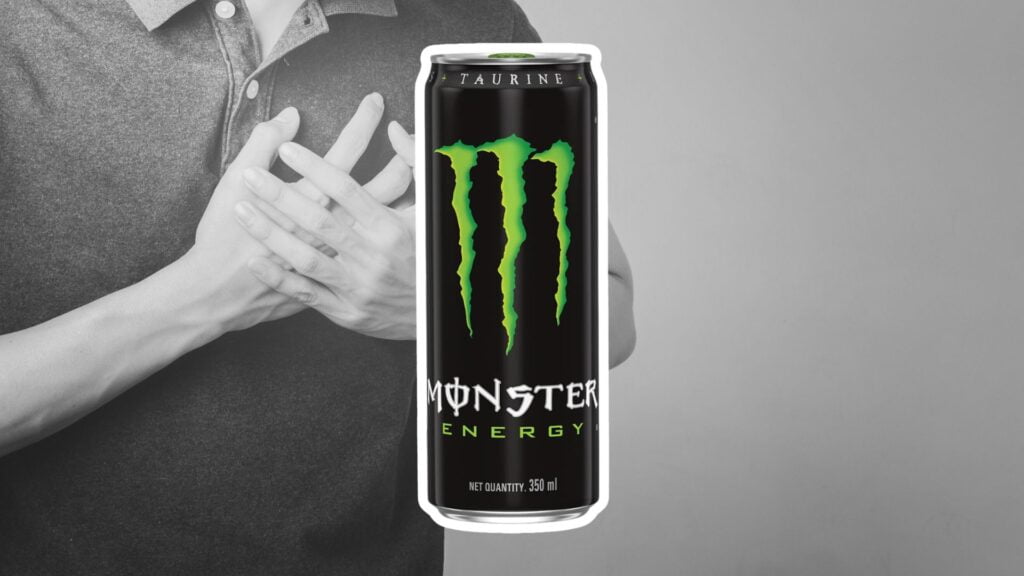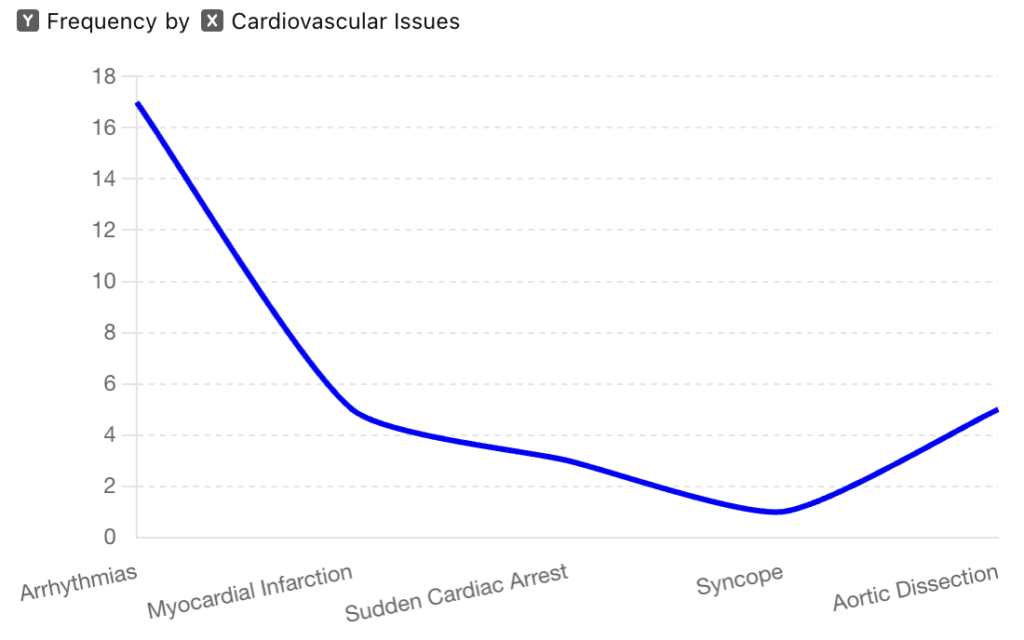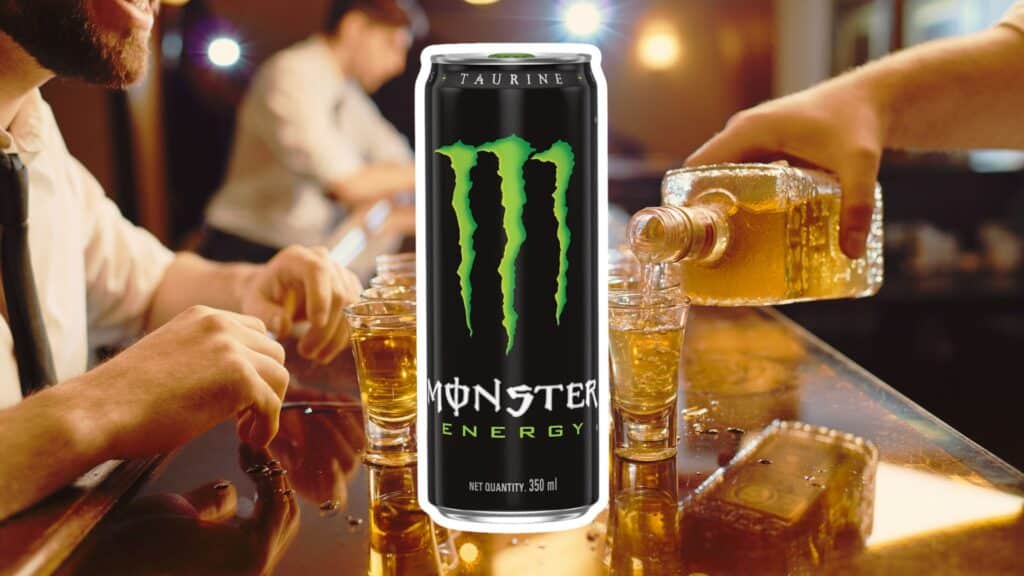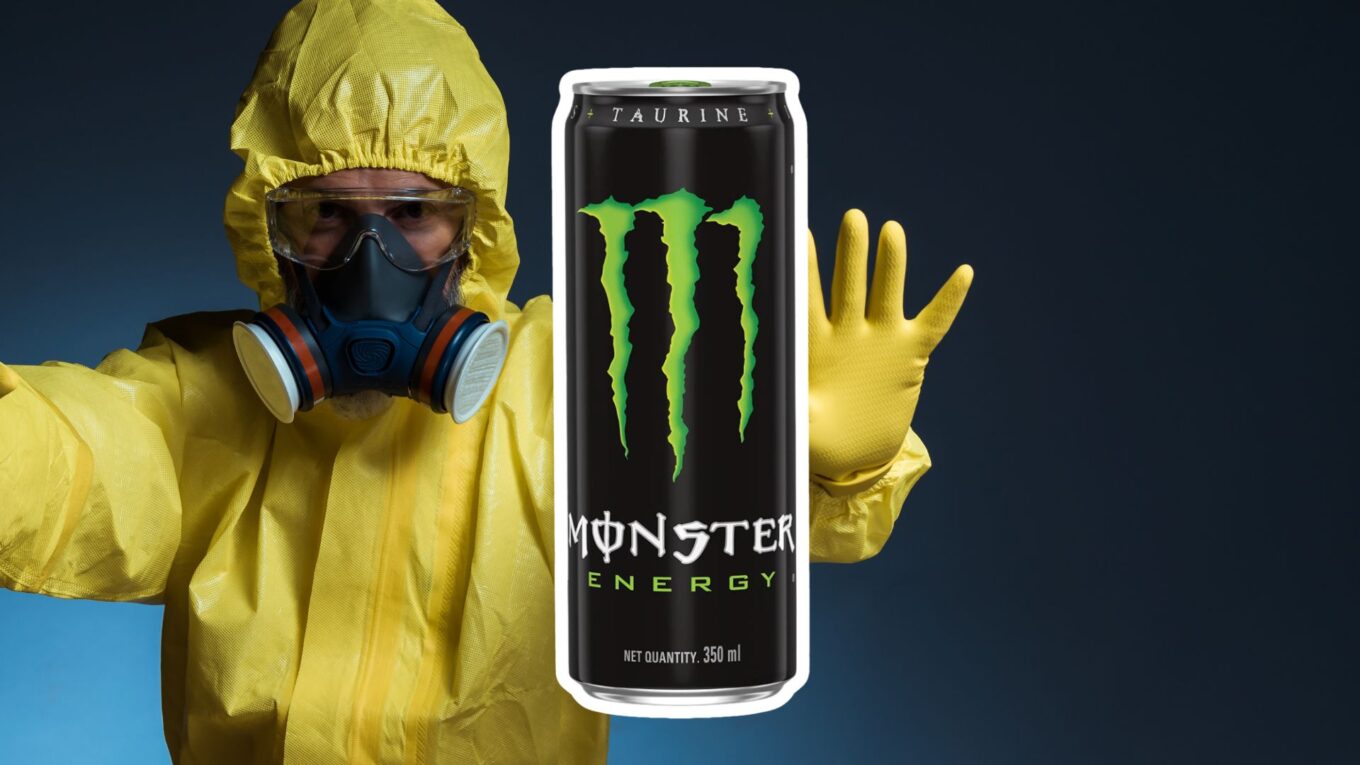Many people consume Monster Energy drinks to get a quick energy boost.
However, these highly caffeinated beverages can pose serious health risks, especially when consumed in excess.
This article will reveal the surprising dangers lurking in those enticing cans, from heart problems to risky behaviors.
You’ll learn about the potentially harmful ingredients and how they can impact your body and mind.
By the end, you’ll understand why thinking twice before reaching for a Monster Energy drink is important.
Get ready to uncover the hidden hazards and discover safer ways to energize yourself.
Hidden Dangers of Monster Energy

Cardiovascular Effects

Monster Energy and other energy drinks have been associated with various cardiovascular problems.
They range from mild symptoms like heart palpitations to severe conditions such as cardiac arrest.
The high levels of caffeine and other stimulants in these drinks can have a significant impact on heart health, especially when consumed in excess.
A single 16-oz can of Monster Energy contains about 160 mg of caffeine
Nearly twice the amount found in a cup of coffee.
This high caffeine content can easily exceed safe daily consumption limits, particularly for those who drink multiple cans or have a lower tolerance for caffeine.
1. Elevated Heart Rate
High caffeine intake can affect cardiovascular function by stimulating the central nervous system and increasing the workload on the heart.
This can lead to an elevated heart rate, increased blood pressure, and potentially dangerous heart rhythm disorders.
Caffeine increases heart rate by stimulating the release of:
- Norepinephrine
- Epinephrine
- Hormones that speed up heart contractions
This effect can lead to palpitations and potentially dangerous arrhythmias, especially in those with underlying heart conditions.
2. Increased Blood Pressure
Caffeine and other stimulants in Monster Energy can cause a temporary spike in blood pressure by constricting blood vessels and increasing cardiac output.
Over time, regular consumption may contribute to the development of hypertension and related cardiovascular diseases.
Neurological Risks
Monster Energy and other energy drinks contain high doses of caffeine and taurine, which can overstimulate the nervous system.
While these ingredients increase alertness and improve concentration, excessive consumption can lead to various neurological problems.
A single 16 oz can of Monster Energy contains 160 mg of caffeine, a significant amount compared to other caffeinated beverages.
Additionally, each can contain 2,000 mg of taurine, an amino acid that plays a role in neurotransmission.
Combining high caffeine and taurine levels can profoundly impact the nervous system.
1. Seizures
Excessive caffeine intake can lower the seizure threshold, making individuals more susceptible to seizures.
When combined with taurine, which modulates neurotransmitter activity, the risk of seizures may be further increased.
People with a history of seizures or epilepsy should be particularly cautious about consuming energy drinks like Monster Energy.
2. Anxiety and Psychosis
The high caffeine content in Monster Energy can lead to heightened anxiety, restlessness, and even panic attacks in some individuals.
Moreover, there have been reports of psychosis and manic episodes linked to excessive energy drink consumption, particularly in people with underlying mental health conditions.
3. Adverse Effects on Mental Health
Chronic consumption of high-caffeine energy drinks like Monster Energy may have long-term implications for mental health.
- Regular intake has been associated with an increased risk of developing persistent anxiety and depression.
- Additionally, the potential for dependence and withdrawal symptoms should not be overlooked, as some individuals may develop a reliance on energy drinks to function normally.
- The high levels of caffeine and taurine found in Monster Energy pose significant risks to the nervous system.
Excessive consumption can lead to severe neurological complications, including seizures, anxiety, and psychotic episodes.
The mechanisms behind these effects involve the interaction of caffeine and taurine with various neurotransmitter systems.
As case studies continue to emerge, raising awareness about the potential dangers of excessive energy drink consumption and encouraging further research into the long-term neurological impacts is crucial.
Gastrointestinal Effects
Monster Energy consumption has been linked to significant gastrointestinal and renal risks, as evidenced by numerous case studies and reports.
1. Abdominal Pain
Monster energy drinks can cause stomach discomfort due to their high caffeine and sugar content.
When consumed, these ingredients can irritate the stomach lining, leading to pain or a feeling of pressure in the upper belly area.
This pain might feel like a dull ache or a sharp, stabbing sensation.
Some people might also feel bloated or have a burning feeling in their chest, often mistaken for heartburn.
The pain can last for several hours after drinking Monster and may get worse if more drinks are consumed.
2. Nausea
In more severe cases, drinking Monster can lead to throwing up.
This happens when the body tries to eliminate something it sees as harmful.
The high levels of caffeine and sugar in Monster can overwhelm the digestive system, causing it to react by forcing the stomach contents back up.
Throwing up might happen soon after drinking Monster or after a delay of an hour or more.
It can be a one-time event or occur multiple times, depending on how much was consumed and how sensitive the person is to the drink’s ingredients.
3. Vomiting
In more severe cases, drinking Monster can lead to throwing up.
This happens when the body tries to eliminate something it sees as harmful.
The high levels of caffeine and sugar in Monster can overwhelm the digestive system, causing it to react by forcing the stomach contents back up.
Throwing up might happen soon after drinking Monster or after a delay of an hour or more.
It can be a one-time event or occur multiple times, depending on how much was consumed and how sensitive the person is to the drink’s ingredients.
4. Diarrhea
Monster can affect bowel movements, often leading to loose or watery stools.
This happens because caffeine can speed up the movement of food and liquids through the digestive system.
It can also increase muscle contractions in the intestines.
Additionally, some people have trouble digesting the artificial sweeteners in Monster, which can pull extra water into the intestines.
This can result in frequent trips to the bathroom, sometimes with urgent needs.
The loose stools might continue for several hours or even a day after drinking Monster, depending on how much was consumed and individual sensitivity.
Renal Effects
1. Flank pain
Drinking too much Monster can lead to pain in the side of the body, near the lower back.
This pain might be related to the kidneys, which are located in this area.
The high levels of caffeine and other ingredients in Monster can put extra stress on the kidneys.
This stress might cause the kidneys to swell slightly, leading to a dull ache or sharp pain in the side.
The pain might come on suddenly and worsen over time if more Monster is consumed.
This pain might sometimes spread to the lower belly or groin area.
2. Decreased urine output
Monster energy drinks can affect how much pee a person makes.
While caffeine often makes people pee more at first, drinking too much Monster over time can lead to making less pee.
This happens because the drink can change how the kidneys work.
The kidneys might also not filter blood, meaning less pee is made.
People might notice they’re going to the bathroom less often or that fewer pees come out when they do go.
This can indicate that the kidneys aren’t working as they should.
Gynecological Effects
Impact on Pregnancy Monster Energy’s high sugar content has been linked to certain gynecological issues, particularly during pregnancy.
1. Macrosomia
Where newborns have significantly higher birth weights due to excessive maternal sugar intake from energy drinks like Monster.
Additionally, there have been incidents of:
2. Severe menstrual bleeding
Drinking Monster might affect menstrual cycles in some people, including making periods heavier.
This is mainly due to the high caffeine content in the drink.
Caffeine can change hormone levels in the body, possibly increasing estrogen production. These changes can affect the menstrual cycle.
Severe bleeding might mean periods that last longer than seven days, needing to change pads or tampons every hour or less, passing large blood clots, or bleeding so much it interferes with daily life.
Autoimmune and Skin Reactions
1. Erythema Multiforme
Monster Energy contains synthetic taurine, which is associated with developing erythema multiforme in some individuals.
This skin condition is characterized by:
- Red
- Target-like patches
- Lesions can appear on various parts of the body.
While the exact mechanism is not fully understood, synthetic taurine may trigger an immune response that leads to this skin reaction.
2. Allergic Reactions
Some ingredients in Monster Energy have been known to cause allergic reactions in sensitive individuals.
Reports of angioedema, a condition with the following effects.
- Certain areas of the skin swell up
- Erythema
- Redness of the skin
has been linked to the consumption of this energy drink.
These reactions may be due to specific additives or the high concentration of certain compounds like caffeine and taurine.
Monster Energy: Interactions with Alcohol and Other Substances

1. Poisoning
Combining Monster Energy with alcohol can be particularly dangerous, as the high caffeine content can mask the intoxicating effects of alcohol.
This may lead individuals to consume more alcohol than they realize, increasing the risk of alcohol poisoning and other associated dangers.
Studies have also shown that the combination of Monster Energy and alcohol can amplify cardiovascular and neurological risks, such as
- Increased heart rate
- Blood pressure
- Impaired cognitive function.
2. Jitteriness
Drinking Monster can make people feel shaky or jumpy, often called jitteriness.
This happens because of the high amount of caffeine in the drink.
When someone drinks Monster, the caffeine speeds up their body’s systems and triggers the release of stress hormones like adrenaline.
These hormones prepare the body for action, even when it is unnecessary.
As a result, people might experience shaking hands, twitching muscles, and a racing heartbeat.
They might feel restless or on edge, struggling to sit still or focus on one thing. Some describe it as feeling “wired” or overly alert.
3. Anxiety
Consuming Monster Energy alongside other stimulants, such as caffeine pills or medications containing caffeine, can lead to a dangerously high intake of stimulants.
It is crucial to be aware of the total stimulant intake from various sources and avoid combining Monster Energy with other stimulant-containing substances.
Further research and public health initiatives are necessary to understand the full spectrum of risks better and develop mitigation strategies.
By staying informed and making responsible choices, consumers can reduce their risk of experiencing these potentially harmful effects.
Conclusion
In conclusion, the hidden dangers lurking in Monster Energy drinks should not be taken lightly.
From potential cardiovascular and neurological risks to lesser-known concerns like gastrointestinal and renal issues, the high levels of caffeine, sugar, and other stimulants in these beverages can have serious consequences.
While the allure of increased energy and alertness may be tempting, it’s crucial to prioritize your health and well-being.
By staying informed about the risks, adhering to recommended consumption limits, and making responsible choices, you can protect yourself from the potential harm posed by excessive Monster Energy intake.
So, the next time you reach for that enticing, remember the importance of moderation and consider healthier alternatives. Your body will thank you in the long run.
Frequently Asked Questions
What Are The Main Health Risks Associated With Consuming Monster Energy Drinks?
Cardiovascular issues, neurological problems, gastrointestinal distress, renal complications, and potential interactions with alcohol and other substances.
How Much Caffeine Is Considered Safe To Consume Per Day According To FDA And EFSA Guidelines?
FDA and EFSA recommend a maximum daily intake of 400 mg of caffeine for healthy adults and 200 mg for pregnant women.
Are There Any Specific Age Groups That Should Avoid Consuming Monster Energy Drinks?
Children, adolescents, pregnant women, and individuals with pre-existing health conditions should avoid consuming Monster Energy drinks.
What Are The Potential Long-Term Effects Of Regularly Consuming Energy Drinks Like Monster Energy?
Regular consumption may lead to chronic health issues such as persistent anxiety, depression, sleep disorders, cardiovascular disease, and an increased risk of substance dependence.
What Steps Can Be Taken To Mitigate The Risks Associated With Energy Drink Consumption?
Limit intake to recommended levels, avoid mixing with alcohol or other stimulants, stay informed about potential risks, and consider healthier alternatives for boosting energy.




